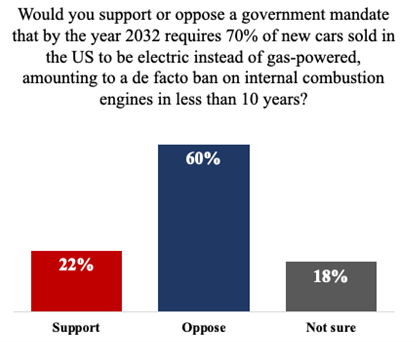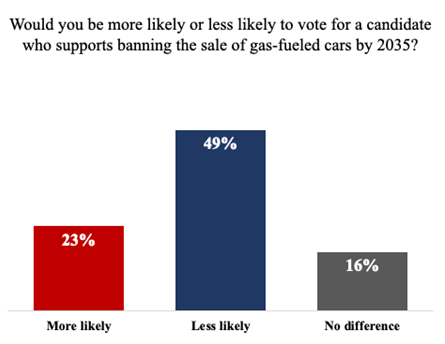Washington, D.C., December 4, 2023 – Today, ahead of the House of Representatives’ consideration of H.R. 4468, the Choice in Automobile Retail Sales Act (CARS Act), the American Fuel & Petrochemical Manufacturers (AFPM) released the results of a national survey fielded among n=1,089 likely general election voters. The data show Americans strongly oppose EPA’s vehicle tailpipe emissions proposal for model years 2027-2032 and are less likely to vote for candidates who support banning sales of gas-fueled vehicles.
- Six out of ten (60%) of 2024 general election voters oppose government policy that, by 2032, would require 70% of new cars sold in the U.S. to be electric (essentially, EPA’s light duty vehicle tailpipe emission proposal for model years 2027-2032). Roughly eighteen percent (18%) of those surveyed don’t yet have an opinion, indicating one-fifth of the electorate is ripe for additional education and advocacy. While Republicans are near universal (87%) in their opposition to EPA’s de facto ban proposal, a majority of Independents are also opposed (61%). Democrats are split on the matter, with nearly half either opposed (32%) or not sure (27%), and just forty-one percent (41%) who support the mandate.

- Roughly half of all voters (49%) say they are less likely to vote for a candidate who supports banning the sale of gas-fueled cars by 2035 (California’s timeline for eliminating sales of traditional gas, diesel, flex fuel and hybrid vehicles). On this question, 78% of Republicans said they would be less likely to support ban-backing candidates as did 52% of Independent voters, underscoring significant potential vulnerability for candidates in competitive contests. Even among Democrat voters, there is very little upside for candidates supporting a ban. A majority of surveyed Democrats say support for gas-vehicle bans either makes them less likely to vote for a candidate (27%) or makes no difference at all (35%).

Members of the House of Representatives should consider these findings ahead of their votes this week on the CARS Act. The legislation, introduced by Representative Tim Walberg (MI-5), is aimed squarely at EPA’s light duty vehicle tailpipe emission proposal covering model years 2027-2032.
- What it does: The CARS Act will stop EPA from finalizing its proposal to require roughly 70% of new car and truck sales to be electric in less than 10 years.
- What it does not do: The CARS Act will not interfere with EPA’s ability to set ambitious vehicle emissions standards, but it will clarify that EPA standards must be technology neutral, meaning the Agency cannot use standards to ban or otherwise limit access to any vehicle powertrain technologies.
Voting YES on the CARS Act to stop EPA’s de facto ban on internal combustion engine vehicles is in line with the majority of American voters.
Methodology
On behalf of AFPM, the survey was conducted by Remington Research Group from November 20 through November 21, 2023. Interviews were collected among n=1,089 likely 2024 General Election voters. Survey weighted to match expected turnout demographics for the 2024 General Election. Margin of Error is + 3% with a 95% level of confidence.
The American Fuel & Petrochemical Manufacturers (AFPM) is the leading trade association representing the makers of the fuels that keep us moving, the petrochemicals that are the essential building blocks for modern life, and the midstream companies that get our feedstocks and products where they need to go. We make the products that make life better, safer and more sustainable — we make progress.


